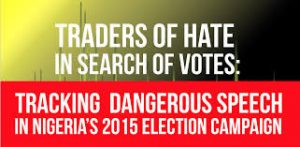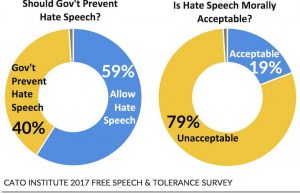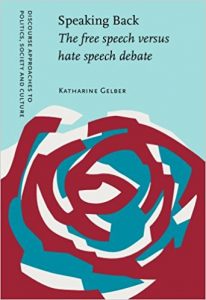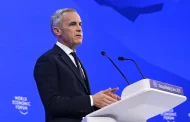The battle against the phenomenon of hate speeches might be taking a new turn in Nigeria shortly with the planned launching of the voluntary campaign declaration on hate speech. Not only are the media and political parties being invited to sign up to the campaign, it would commit the political parties to disqualifying any politician who has engaged in hate speech from seeking nomination on their platforms. The idea of anything called hate speech remains contested. In other climes such as the United States, surveys show stunning conceptions of it, with some people categorising it unacceptable but only on moral terms.

As it was in 2015 would it still be in 2019?
 But an Annual Evaluation Meeting of the Hate Speech Project which ended in Bauchi State of Nigeria Friday, January 26th, 2018 rated politicians as one of the six leading drivers of hate speeches. According to Mallam Y Z Y’au, Executive Director of Centre for Information Technology and Development, (CITAD) who spoke at a Press conference marking the end of the meeting, politicians deliberately capitalizing on current difficulties in the country by encouraging hate speech is part of the problem. Hate speeches, he said, find outlet in the social, print and broadcast media but also increasingly in religious spaces such as mosques, churches and shrines as well as in secular spaces such markets, schools, community halls, etc partly because the deployment of hate speeches as a gratuitous campaign tool by politicians is not punished. Instead, it leaves them profiting from it.
But an Annual Evaluation Meeting of the Hate Speech Project which ended in Bauchi State of Nigeria Friday, January 26th, 2018 rated politicians as one of the six leading drivers of hate speeches. According to Mallam Y Z Y’au, Executive Director of Centre for Information Technology and Development, (CITAD) who spoke at a Press conference marking the end of the meeting, politicians deliberately capitalizing on current difficulties in the country by encouraging hate speech is part of the problem. Hate speeches, he said, find outlet in the social, print and broadcast media but also increasingly in religious spaces such as mosques, churches and shrines as well as in secular spaces such markets, schools, community halls, etc partly because the deployment of hate speeches as a gratuitous campaign tool by politicians is not punished. Instead, it leaves them profiting from it.
CITAD is, therefore, urging the National Human Rights Commission to continue with hearing and documentation of cases filed against some politicians who deployed hate speech in the 2015 general elections with a view to not only prosecuting them but also enrolling them to a hall of shame that will serve as disincentive for hate speech by politicians.
Arguing that people can immunize themselves against the violence catalyzing effect of hate speeches, it says the key principle is for people to not indulge in hate speeches and to refuse to be provoked by it. It is also calling for the establishment of a national peace commission just as it is also advancing the case for a legislation to regulate preaching as well as provide clear framework for the teaching of religious studies in a way consonant with national aspiration for a peaceful and united country. A quick review of the national peace architecture with a view to establishing such a commission is, in the opinion of the meeting, apt now because such a commission would have the mandate of promoting peace building, conflict resolution and engendering a culture of community dialogue at all levels.
The meeting did not stop at these two recommendations, it also gave priority to the building of the self engagement capacity of communities in relation to the sort of dialogue that enables them resolving their conflicts rather than leave them to fester and spiral into violent confrontations and bloodshed. Its fourth item is mainstreaming peace education in the civic education component of the secondary school education curriculum in the country.

The debate continues
Listing a few other things required to take the anti-hate speech campaign to the threshold, the meeting attended by partner members from Ministries of Education from Kano, Yobe, Bauchi, Taraba, Gombe and Jigawa States as well as members of the Students for Peace from various tertiary institutions and Peace Ambassadors/Peace Club Advisers from different states of the federation listed these to include the consistency, impartiality, transparency and consultative bent of the government in the way in which it is prosecuting its programmes, including the anti-corruption agenda; all media regulatory agencies waking up to their responsibilities of ensuring effective implementation of all the laws and regulations governing the media space as far as sanctioning media organizations, individuals and advertisers who deploy hate speeches is concerned and, finally, conducting review of on-going media regulatory frameworks across all instruments and by all the agencies to ensure that they have mainstreamed strategies and mechanisms to effectively deal with hate speech.
But beyond the government, it sees a role for religious and community leaders in terms of speaking out against hate speech, condemning all those who engage in it and ensuring they do not themselves condone hate speech in their spaces.
Scoring the campaign against hate speech to have gathered momentum and moved from a lone voice to a multiplicity of voices, including government agencies such as the National Orientation Agency (NOA), the meeting noted with satisfaction that some of the media regulatory agencies, especially the Nigeria Broadcasting Commission, have begun the process of reviewing their laws to take on board the need to deal with hate speech in the media. It reports the resolution of the House Committee on National Security and Intelligence after a meeting with the anti-hate speech campaigners to introduce a hate speech bill to the National Assembly, using the draft that was produced by the Interfaith Centre, Kaduna. It also noted the statement by government to monitor hate speech online, calling for a more detailed strategy on how this would be done.
The debit side of the campaign is, however, what it calls the resurgence of hate speech across the country, centering on religious and ethnic diversity. More than before, it says, the country is becoming more and more divided, expressing fears as Nigeria moves towards the 2019 elections unless all stakeholders work against the trend. Any further violence could compound the situation that is already seeing many violent clashes in the country, it fears.




























